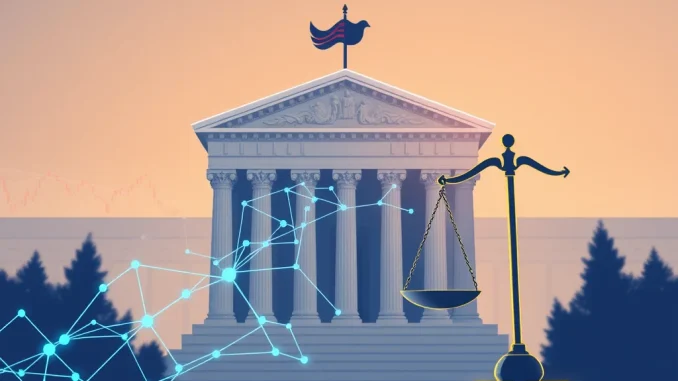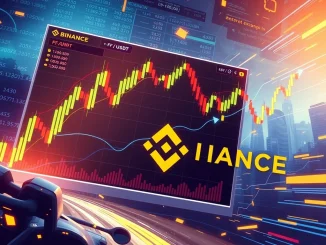
The world of decentralized finance (DeFi) is constantly evolving, and the intersection with traditional financial regulation is becoming increasingly important. A significant development recently occurred when **Hyperliquid**, a leading decentralized exchange, took a proactive step by submitting comment letters to the U.S. Commodity Futures Trading Commission (CFTC).
What Happened? Hyperliquid Engages the CFTC
Hyperliquid Labs, a core contributor to the Hyperliquid platform, announced their submission of two comment letters to the **CFTC**. These letters were a direct response to recent Requests for Comment (RFC) issued by the commission. The RFCs sought input on crucial aspects of modern trading, specifically focusing on perpetual derivatives (often called perpetuals or **perpetual futures**) and the implications of 24/7 trading markets.
Engaging with regulators like the **CFTC** is a key step for DeFi platforms seeking clarity and a path forward in established financial systems. It signals a willingness to participate in the regulatory conversation rather than operate solely outside of it.
Decoding Perpetual Futures and Regulatory Focus
**Perpetual futures** are a type of derivative contract popular in crypto trading. Unlike traditional futures, they don’t have an expiry date, allowing traders to hold positions indefinitely, as long as they meet margin requirements. This flexibility, combined with the leverage often available, makes them attractive but also presents unique challenges for regulators concerned with market stability and consumer protection.
The **CFTC**, as the primary regulator for derivatives markets in the U.S., is naturally interested in understanding how these instruments function, especially when offered on novel platforms like decentralized exchanges. Their RFC on **perpetual futures** aimed to gather insights into their use cases, the potential risks and opportunities they present, and how they fit within or challenge existing regulatory frameworks.
The Power of On-Chain: Why a Decentralized Exchange Engages Regulators
Hyperliquid’s core argument, detailed in their Medium post and presumably reiterated in their letters to the **CFTC**, centers on the benefits of bringing perpetual derivatives on-chain. For a **decentralized exchange**, operating on a blockchain offers inherent advantages that differ significantly from centralized counterparts or traditional finance. Hyperliquid highlighted key benefits:
- Transparency: All transactions and positions are recorded on a public, immutable ledger. This provides a level of transparency often lacking in traditional markets, allowing anyone to verify market activity (though not necessarily individual identities).
- Composability: On-chain assets and protocols can often be easily integrated with other DeFi applications. This fosters innovation and creates complex financial ecosystems.
- Self-Custody: Users typically retain control of their private keys and funds, rather than entrusting them to a centralized entity. This reduces counterparty risk associated with the exchange holding assets.
These features are fundamental to the operation of a **decentralized exchange** and present a different risk profile compared to centralized platforms. Hyperliquid’s letters likely aimed to educate the **CFTC** on these distinctions and argue why the unique characteristics of on-chain trading can be beneficial from a regulatory perspective, particularly regarding transparency and risk management through self-custody.
Navigating US Crypto Regulation: A Proactive Approach
The landscape of **crypto regulation** in the United States is still developing. Various agencies, including the **CFTC** and the SEC, are working to determine how best to oversee digital assets and related activities. This creates uncertainty for businesses operating in the space.
Hyperliquid’s decision to proactively engage with the **CFTC** through comment letters is a strategic move. It allows them to:
- Provide technical expertise and real-world operational insights from a **decentralized exchange**.
- Advocate for regulatory approaches that recognize the unique nature of blockchain technology and DeFi.
- Potentially help shape future rules in a way that supports innovation while addressing regulatory concerns.
The RFC on 24/7 trading also touches on a key challenge for regulators: traditional financial markets have set hours, while crypto markets operate around the clock globally. This requires new approaches to market surveillance, enforcement, and ensuring fair practices.
Opportunities and Challenges Ahead
The engagement between platforms like Hyperliquid and regulators like the **CFTC** presents both opportunities and challenges.
Opportunities:
- Potential for clearer rules for **perpetual futures** and **decentralized exchange** operations.
- Increased regulatory certainty could encourage broader institutional adoption.
- Dialogue can lead to more effective and less burdensome regulations.
Challenges:
- Regulators may still struggle to fully grasp the technical nuances of DeFi.
- Balancing innovation with investor protection is complex.
- Different regulatory bodies may have conflicting views on **crypto regulation**.
Summary
Hyperliquid Labs’ submission of comment letters to the **CFTC** is a noteworthy event in the ongoing dialogue between the DeFi space and traditional finance regulators. By articulating the benefits of on-chain **perpetual futures** and the unique aspects of operating a **decentralized exchange**, Hyperliquid is actively participating in shaping the future of **crypto regulation** in the U.S. This proactive engagement is crucial for fostering understanding and potentially paving the way for clearer guidelines for the burgeoning decentralized finance market.



